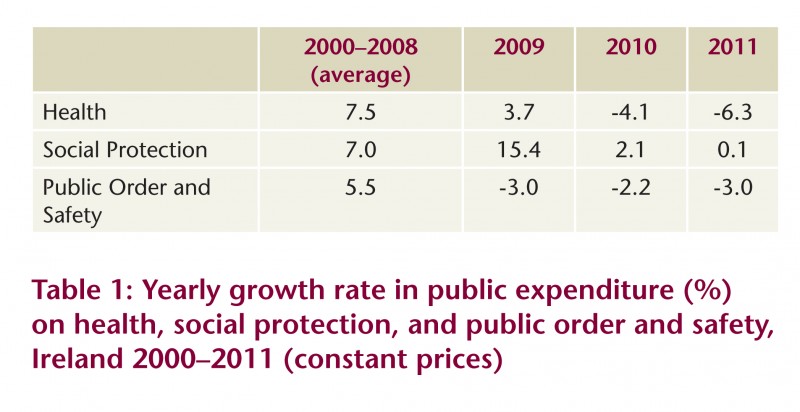Pike, Brigid (2015) Financing drug policy during the recession. Drugnet Ireland, Issue 53, Spring 2015, pp. 8-9.
| Preview | Title | Contact |
|---|---|---|
|
PDF (Drugnet Ireland 53)
2MB |
A recent EMCDDA Paper explores how the economic recession that started in 2008 affected public spending on drug-related initiatives in EU member states, including Ireland.1 The authors used quantitative and qualitative data provided in the annual reports of the national focal points (NFPs), including the Irish NFP based in the Health Research Board. Using this data, they examined public expenditures on health, social protection and public order and safety, as these are the areas of government activity where most drug-related activities are provided. The authors concluded:
- Austerity has led to reductions in spending in those categories of government activity that encompass most drug-related initiatives.
- Countries that experienced greater levels of austerity tended to show greater reductions in expenditure.
- Bigger cuts in public expenditure were registered in health than in public safety and social protection.
The authors divided the27 EU countries and Norway into four groups according to the severity of the impact of the economic recession in each country. Ireland falls into the fourth group of countries, along with Greece, Spain, Latvia, Lithuania, Portugal and Slovakia – Group 4 – which includes the countries hardest hit by the economic recession. In 2009, on average, the GDP of these Group 4 countries fell by close to 7% (5.5% in Ireland), and in the two subsequent years recovery was weakest among these countries: in 2011 youth unemployment was on average 35.5% (29.1% in Ireland) and total unemployment was 16% (14.7% in Ireland).
Public expenditure on health, social protection and public order and safety
Among the Group 4 countries, the pattern of growth of public expenditure components that encompassed most drug-related activities changed markedly. Between 2000 and 2007, expenditure grew faster on average in Group 4 countries than in the other groups; after economies went into recession, the biggest falls in expenditure occurred in Group 4 countries. Health expenditure was particularly hard hit, declining in real terms by 7.0% in 2010 and 4.6% in 2011, on average. Expenditure on social protection also fell markedly, especially taking into account the increase observed in unemployment (down 1.1% in 2010 and 2.3% in 2011). Public order and safety expenditure managed to maintain a very modest real growth rate (0.4%) in 2010, but this was not sustained in 2011 (down 3.3%). The pattern of changes in Ireland was broadly similar (see Table 1).

The authors conceded that drug-related expenditures represent a small proportion of these aggregates, and it cannot be inferred that public spending on drug initiatives necessarily behaved in a similar manner. However, they suggested that reductions in funding in these areas may have had an indirect impact on drug-related initiatives.
Public expenditure on drug-related initiatives
With regard to specific drug-related public spending, the authors noted that among Group 4 countries, trend analysis of labelled drug-related public expenditure was only possible for Ireland, where it was found that drug-related public expenditure increased between 2005 and 2008 but decreased after 2008, probably owing to the public austerity measures that followed the economic recession. In 2009, the need to achieve a ‘prudent fiscal outturn’ led to an attempt to cut labelled drug-related expenditure across all government bodies in Ireland, and between 2008 and 2013 public expenditure on drug-related programmes declined overall by 14.3% (see Table 2).

Seeking greater cost-effectiveness
Ireland is reported as one of the countries that adopted policies specifically to either limit the potential damage of austerity or take advantage of the adverse period to improve efficiency. The Reitox NFP reports on Ireland, on which the authors of this EMCDDA Paper drew, describe a number of reports completed during the recession identifying opportunities for making savings, especially administrative efficiencies.3 The authors also noted a report by one regional drugs task force which, in anticipation of a decline in funding, commissioned a study to evaluate the effectiveness and efficiency of its 30 projects.
Outcomes
The most common types of outcomes used for assessing the cost-effectiveness of drug-related health interventions (e.g. the amounts and types of substance use, treatment retention rates, mental and physical health status, quality of life status at end of treatment) only become visible after some time. The authors concluded that a full analysis of the impact of the recession on drug initiatives will only be possible after some period of delay. They cited a 2014 OECD report on the impact of the economic recession:4
It is still too early to quantify the longer-term effects on people’s health, but unemployment and economic difficulties are known to contribute to a range of health problems, including mental illness… Short-term savings may translate into much higher costs in the future, and governments should make funding of investment-type programmes a priority… Maintaining and strengthening support for the most vulnerable groups must remain a crucial part of any strategy for an economic and social recovery. (pp. 11–12)
1 European Monitoring Centre for Drugs and Drug Addiction (2014) Financing drug policy in Europe in the wake of the economic recession. EMCDDA Papers. Luxembourg: Publications Office of the European Union. https://www.drugsandalcohol.ie/23115/
2 Health Research Board (2014) 2014 National Report (2013 data) to the EMCDDA by the Reitox National Focal Point. Ireland: new developments, trends. Dublin: Health Research Board. https://www.drugsandalcohol.ie/23170/
3 See accounts of these reports in Section 3.4 ‘Economic Analysis’ of the Health Research Board’s Reitox National Focal Point national reports to the EMCDDA for 2010 and 2012, which may be accessed respectively at https://www.drugsandalcohol.ie/14714/ and https://www.drugsandalcohol.ie/18808/
4 OECD (2014) Society at a glance 2014: the crisis and its aftermath. OECD Social Indicators. Paris: OECD Publishing. http://dx.doi.org/10.1787/soc_glance-2014-en
Repository Staff Only: item control page